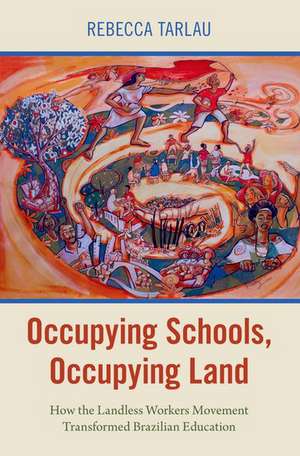Occupying Schools, Occupying Land: How the Landless Workers Movement Transformed Brazilian Education: Global and Comparative Ethnography
Autor Rebecca Tarlauen Limba Engleză Paperback – 5 oct 2021
| Toate formatele și edițiile | Preț | Express |
|---|---|---|
| Paperback (1) | 186.82 lei 10-16 zile | |
| Oxford University Press – 5 oct 2021 | 186.82 lei 10-16 zile | |
| Hardback (1) | 368.61 lei 31-37 zile | |
| Oxford University Press – 20 iun 2019 | 368.61 lei 31-37 zile |
Preț: 186.82 lei
Preț vechi: 210.35 lei
-11% Nou
Puncte Express: 280
Preț estimativ în valută:
35.75€ • 37.42$ • 29.58£
35.75€ • 37.42$ • 29.58£
Carte disponibilă
Livrare economică 05-11 martie
Preluare comenzi: 021 569.72.76
Specificații
ISBN-13: 9780197584347
ISBN-10: 0197584349
Pagini: 414
Ilustrații: 14 line drawings; 17 half tones
Dimensiuni: 235 x 160 x 25 mm
Greutate: 0.59 kg
Editura: Oxford University Press
Colecția OUP USA
Seria Global and Comparative Ethnography
Locul publicării:New York, United States
ISBN-10: 0197584349
Pagini: 414
Ilustrații: 14 line drawings; 17 half tones
Dimensiuni: 235 x 160 x 25 mm
Greutate: 0.59 kg
Editura: Oxford University Press
Colecția OUP USA
Seria Global and Comparative Ethnography
Locul publicării:New York, United States
Recenzii
This is a brilliant book by a brilliant young scholar. It is one of the finest studies available on the Brazilian Landless Movement (the MST), perfectly balancing rigorous comparative institutional analysis with an activist's appreciation for social justice and an ethnographer's attention to detail. Tarlau captures nicely the complexity of the political landscape in Brazil, and she makes a compelling argument for the underappreciated role that education can play in institutionalizing social mobilization
It's hard to know where to begin in praise of Occupying Schools, Occupying Land. For starters, this is political ethnography at its very best.ÂTarlau has also given us the richest study of Movimento dos Trabalhadores Rurais Sem Terra produced to date.ÂBut to me, the great value of the book is the powerful corrective it offers to that strand of social movement theory that views engagement with political institutions as inherently conservative. Never has the 'long march through institutions'
This book is essential reading for anyone who is concerned with the struggles for a more critically democratic set of social and educational policies. It paints a nuanced and powerful picture of the role of a crucial social movement in necessary transformations.
This book powerfully illustrates the possibilities (and perils) when social movements like Brazil's MST engage the state. Through rich ethnography and capacious theorizing, the book translates a central insight of Latin American critical traditions for a North American audience: that it is possible to engage institutions in ways that strengthen movements and transform political horizons. This is a timely and deeply relevant book for not only Brazil and Latin America, but also for all contemporary debates on socialism, democracy, and the future of the left
Occupying Schools, Occupying Land is an extraordinary piece of scholarship, both in its fine-grained empirical narrative and its theoretical argument. The originality of its insights and arguments go far beyond research on the Landless Peasant Movement and schools in Brazil. It is an important contribution to the Gramscian current of social theory and should be read by anyone interested in the potentials and dilemmas of struggles for progressive social transformation in capitalist societies.
Tarlau's impressively organized text is framed as a rebuttal to Michels (1915) and Piven and Cloward (1977), who suggest that movements inevitably deradicalize and demobilize as they engage more with the state.
It's hard to know where to begin in praise of Occupying Schools, Occupying Land. For starters, this is political ethnography at its very best.ÂTarlau has also given us the richest study of Movimento dos Trabalhadores Rurais Sem Terra produced to date.ÂBut to me, the great value of the book is the powerful corrective it offers to that strand of social movement theory that views engagement with political institutions as inherently conservative. Never has the 'long march through institutions'
This book is essential reading for anyone who is concerned with the struggles for a more critically democratic set of social and educational policies. It paints a nuanced and powerful picture of the role of a crucial social movement in necessary transformations.
This book powerfully illustrates the possibilities (and perils) when social movements like Brazil's MST engage the state. Through rich ethnography and capacious theorizing, the book translates a central insight of Latin American critical traditions for a North American audience: that it is possible to engage institutions in ways that strengthen movements and transform political horizons. This is a timely and deeply relevant book for not only Brazil and Latin America, but also for all contemporary debates on socialism, democracy, and the future of the left
Occupying Schools, Occupying Land is an extraordinary piece of scholarship, both in its fine-grained empirical narrative and its theoretical argument. The originality of its insights and arguments go far beyond research on the Landless Peasant Movement and schools in Brazil. It is an important contribution to the Gramscian current of social theory and should be read by anyone interested in the potentials and dilemmas of struggles for progressive social transformation in capitalist societies.
Tarlau's impressively organized text is framed as a rebuttal to Michels (1915) and Piven and Cloward (1977), who suggest that movements inevitably deradicalize and demobilize as they engage more with the state.
Notă biografică
Rebecca Tarlau is Assistant Professor of Education and Labor and Employment Relations at the Pennsylvania State University. She is affiliated with the Lifelong Learning and Adult Education Program, the Comparative and International Education program, and the Center for Global Workers' Rights.











